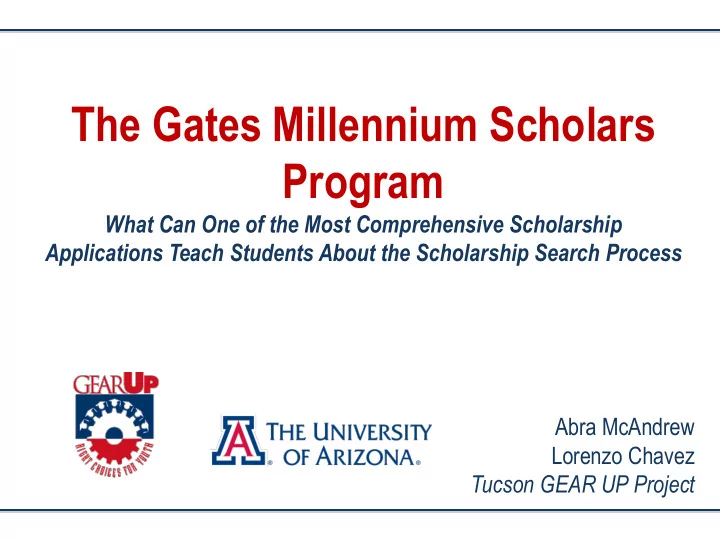

The Gates Millennium Scholars Program What Can One of the Most Comprehensive Scholarship Applications Teach Students About the Scholarship Search Process Abra McAndrew Lorenzo Chavez Tucson GEAR UP Project
• Recommends research-based non- quantitative assessment for admissions and scholarships • 8 Non- Cognitive Variables (NCV’s) predict success for non-traditional students • Can suggest developmental actions
• Admissions & Scholarship Applications o Opportunity to increase awareness of key characteristics o Opportunity to encourage best preparation for success beyond grades and testing • Gates Millennium Scholars Program o Informed by Sedlacek’s research of NCV’s • Tucson GEAR UP Project revisions of NCV’s– College Street Smarts o Employ activities specific to each NCV to help students understand how to acknowledge their strengths o Working with counselors to start using ‘College Street Smarts’ with students at earlier grade level
• Using NCV’s helps us as educators, admissions officers, and scholarship grantees to take a closer look at talented students and gauge their demonstrated: o Involvement (Traditional & Nontraditional) o Resiliency o Ability to Plan for the Future o Social Responsibility o Potential for Success
• 3.3+ Cumulative GPA • Ethnic Minority • African American • American Indian/Alaska Native • Asian Pacific Islander American • Hispanic American • Pell Grant Eligible • Demonstrated Leadership and Community Involvement • U.S. Citizen or Permanent Resident
• Comprehensive scholarship application • Students are assessed on academic backgrounds, but emphasis is placed on non- cognitive variables such as: volunteer and leadership experience, positive self- concept, and self appraisal are also important. • Students are asked to write responses to eight prompts • In addition, students will need to identify a NOMINATOR and a RECOMMENDER • Nominator: Principals, teachers, guidance counselors, higher education reps, and other professional educators familiar with the academic prowess of student • Recommender : Any adult, who is not a family member, familiar with nominee’s community service and leadership activities, such as a supervisor at work or a community leader
Gates Millennium Scholars Program The Application
Discuss the subjects in which you excel or have excelled. To what factors do you attribute your success?
Discuss the subjects with which you had difficulties. What factors do you believe contributed to your difficulties? How have you dealt with them so they will not cause problems for you again? In what areas have you experienced the greatest improvement? What problem areas remain?
Briefly describe a situation in which you thought you or others were treated unfairly or were not given an opportunity you thought you deserved. Why do you think this happened? How did you respond? Did the situation improve as a result of your response?
Discuss your short and long-term goals. Are some of them related? Which are priorities?
Discuss a leadership experience you have had in any area of your life: school, work, athletics, family, church, community, etc. How and why did you become a leader in this area? How did this experience influence your goals?
Discuss your involvement in and contributions to a community near your home, school or elsewhere. Please select an experience different from the one you discussed in the previous question, even if this experience also involved leadership.
Other than through classes in school, in what areas (non- academic or academic) have you acquired knowledge or skills? How?
Is there anything else you would like to tell us about personal characteristics, obstacles you have overcome, etc. that may help us evaluate your nomination? Please do not reiterate information you already have provided. This is your opportunity to state something about yourself that was not asked previously.
National Scholarship Essay Workshop Program • Why? • The financial component of preparing for college is one of the main concerns low-income families use as a deciding factor for the continuation of their children’s education, even for high -ability students • EAO and GEAR UP saw an opportunity to offer a program that could potentially benefit families within the cohort, and help to relieve their financial stress • 20-25 students participants recruited per site • Comprehensive 12-hour scholarship preparation program • 3- 4 hour Saturday sessions hosted at The University of Arizona, facilitated by school site instructors (1 per school)
• GU College Coaches at each site prescreened candidates based on GPA and ethnicity • Some sites used free/reduced lunch status as an indicator for Pell Grant Eligibility • Current GMSP Scholars invited to information sessions to share testimony and encourage students to apply • Students used the FAFSA4Caster online tool to determine Pell Grant Eligibility • www.fafsa4caster.ed.gov, EFC Range: 0-4617 • Students submitted registration form to participate
• Facilitators use Writing Workshop Process to help students think through and write responses to the 8 prompts during the three sessions • Students required to hold follow-up conferences with site facilitators between workshops to further develop and refine responses • GU will also assist participants in selection process of their Recommender • Host a Recommenders’ Dinner to share useful tips as they complete their recommendations • GMSP application is released early in the fall semester and closes mid-January of the following year • Program is ideal for implementation mid-fall semester, dependant on resources
To Learn More Visit: Gates Millennium Scholars Program www.gmsp.org
Questions?
Recommend
More recommend